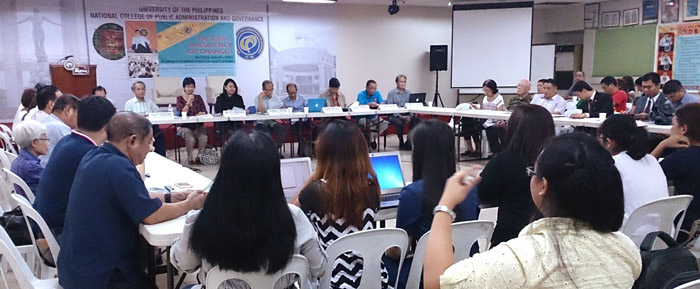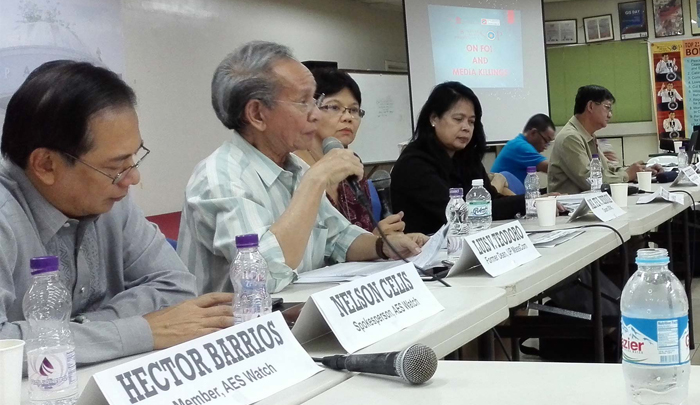TRACKING THE DUTERTE ADMINISTRATION
Views and prognosis by CenPEG Fellows in 8th State of the Presidency
CenPEG News
August 1, 2016
Temario C. Rivera, Board chair of the Center for People Empowerment in Governance (CenPEG), says the proposed Federalist system of government risks being mistaken as an one-size fits all type of solution to the country’s endemic problems.
Speaking first during CenPEG’s 8th State of the Presidency (SoP) on July 28, 2016, Rivera said that so far Federalism proponents led by the new president himself, Rodrigo R. Duterte (RRD), agree only on the principle of “self-rule and shared rule” which is being used to provide for the fair allocation of development resources among the regions and as a final solution to the decades-old struggle for self-determination of the Moro people as well as national minorities. He proposed, however, that adopting the Federalist system of government should go hand in hand with having an effective anti-dynasty law and a real political party system, among other requisites.
Held in cooperation with the Dean’s office of the National College of Public Administration and Governance (NCPAG) of UP in Diliman as well as the Integrated Development Studies Institute (IDSI), CenPEG’s annual SoP had nine Fellows taking turns looking into RRD’s policy pronouncements that were also underscored during the president’s first State of the Nation Address (SONA, July 25).

Moderator CenPEG Executive Director Evi Jimenez (3rd from left, head panel) opens the 8th State of the Presidency round-table discussion together with NCPAG Dean Maria Fe Mendoza and CenPEG Fellows. CenPEG photo
The round-table discussion had CenPEG Executive Director Evita L. Jimenez as Moderator while the welcome address was delivered by the NCPAG Dean, Maria Fe V. Mendoza. Sec. Liza Maza, Lead Convener of the National Anti-Poverty Commission (NAPC), was to deliver the Keynote but had to attend an emergency meeting in Malacañang. (See her speech linked to this article.)
The CenPEG Fellows’ salient points are:
- National industrialization policies need appropriate fiscal and financial support which would involve preferential treatment i.e. tax incentives, priority budget and infrastructure, employment and wage policies, environmental / carbon footprint policies, and favor the local industry champions or leaders versus foreign business / MNCs – a track which will not sit well with the neo-liberal champions in the Duterte cabinet. (Maragtas SV Amante, CenPEG Fellow and current Vice President of the UP System)
- To address media issues and to assure the dissemination through the news media of the meaningful, accurate and fair information that the citizenry need as a necessary condition for their informed participation in public affairs, the following are recommended as the specifics of a policy of encouraging media independence and initiative: Create an effective body to address the killing, harassment and other attacks on journalists and media workers; assure the passage of a Freedom of Information (FOI) Act; assure the independence of State media; encourage the formation of an industry-wide union in the press and media; decriminalize libel; amend the Cyber Crime Prevention Act of 2012; review the policy against Presidential press conferences and the designation of State media as the sole vehicle of Presidential communication with the public. (Luis V. Teodoro, CenPEG Board Member and former Dean, UP College of Mass Communication)
- With the country’s lack of experience in federalism, concern is raised how its purported vision would result in developing the country’s political system rather than further entrenching political dynasties and patronage politics in traditional area like Muslim Mindanao. Equally critical is how the Duterte government will deal with major Moro fronts and make them converge to work on a common peace agenda and how to engage other militant groups that are increasingly becoming more problematic and make them cohere, if possible, with Duterte’s vision of peace and political restructuring. (Julkipli Wadi, CenPEG Fellow and former Dean, UP Institute of Islamic Studies)
- Philippine interests in the South China Sea must be defended and asserted without being a pawn to the U.S war machine, the U.S. Asian Pivot and the Trans-Pacific Partnership (TPP). Likewise, the Philippines must not lose substantial economic gains from the rise of China as the world's largest economy and must not be side-lined from the benefits from the Asian Infrastructure and Investment Bank (AIIB). (Excerpt from an earlier commentary by Roland G. Simbulan, CenPEG Fellow, which was also discussed during the SoP)
- The prospects and conditions toward a breakthrough in the Duterte government peace talks with the National Democratic Front of the Philippines (NDFP) include resolving contentious issues such as genuine agrarian reform, national industrialization, and independent foreign policy, among other key issues. Both the government and NDFP have agreed in principle to fast track the peace negotiations but the President himself has hinted that the peace process will take long although he hopes a final peace agreement can be clinched within his term. (Bobby M. Tuazon, CenPEG Director for Policy Studies)
- The basic flaw of the automated election system (AES) is the disempowerment of the people and it has a deadly side effect which is the people’s defenselessness against electoral fraud. We have to recognize this flawed system for what it is -- an attack on our political system. We must pull back from this Orwellian precipice. Elections are exclusively our act; we must be the active party and assume full responsibility. If we fail to do so, “government by the people” will be just a memory. (Hector Barrios, CenPEG Fellow and AES Watch member)
- Should automation still be preferred in 2019: Use Filipino-made AES system; draft and implement COMSTRAT 1722; implement a transparent Random Manual Audit (RMA); take PPCRV out of the AES equation; activate all LGU websites to reflect all ERs instantaneously; active participation of all IT organizations (Nelson J. Celis, CenPEG Fellow, spokesperson of AES Watch, and Executive Vice President, Pamantasan ng Lungson ng Maynila)
- We propose a full proportional representation (PR) voting method in determining the composition of the parliament. Under the federal system each of the State or Region shall be adequately and proportionally represented in the parliament. Also the provinces, independent component cities and the highly urbanized cities - the basic political units of a State or Region - shall be adequately and proportionally represented in the parliament. Proportional representation can be determined by the number of registered voters and by the number of voters who actually voted in the parliamentary election in each State or Region and in each basic political unit. (Felix Muga II, CenPEG Board member)
Panel reactors included: George T. Siy (IDSI), Prof. Marivic Raquiza (NCPAG), Atty. Edwin dela Cruz (International Seafarers Action Center), Prof. Toti Casino (AES Watch and Philippine Computer Society), Prof. Charithie Joaquin (Academics chief, National Defense College of the Philippines), and Roxanne Lim (retired professor and former Dean, UP Asian Center).
Volunteering for the forum secretariat were political science students from UP Manila.
CenPEG’s 8th SoP was attended by representatives of the academic community, students, NGOs, research organizations, legislative staff and political parties, advocacy groups, as well as the diplomatic corps and media. CenPEG News

Luis V. Teodoro (2nd from left) tackles Duterte's Freedom of Information (FOI) executive together and with him from left are Nelson Celis, Jimenez, Mendoza, Fellows Jul Wadi and Roland Simbulan. CenPEG photo
2016 SOP papers
- CHANGE MUST MOBILIZE People's Participation, CenPEG statement SoP July 28 2016
- LIZA MAZA Keynote Address CenPEG 8th SOP July 28 2016
- Temario C. Rivera: Constitutional Change, the Way Forward? Federalism and Related Institutional Reforms
- Felix Muga II: Correcting the Mistakes and Expanding the Scope of the Party-list System
- Maragtas SV Amante: Philippine Industrial & Labor policy: Emerging “Davao Consensus”
- Roland G. Simbulan: Prospects for a Balanced and Independent Foreign Policy
- Bobby M. Tuazon: 30 Years of GRP-NDFP Peace Talks: A Breakthrough under Duterte?
- Julkipli Wadi: DU30, Peace Process, and the Moro Struggle
- Luis Teodoro: State of Philippine Media & Policy Reforms
- Hector Barrios: Reforming Flawed Voting System
- Nelson Celis: Reforming our Flawed Voting System
- Probing presidential platforms
- Conference calls for people-centered policy actions for Asian development and peace
- WWII 'comfort women' urge visiting Japanese emperor: OFFICIAL GOV’T APOLOGY, UPHOLD TRUTH, and JUST COMPENSATION
- FEARLESS FORECAST (EPISODE II): Comelec will not comply with e-Commerce Law in 2016 elections
- Fearless forecast: Comelec’s non-compliance with the AES law in 2016 (last of 2 parts)
- Fearless forecast: Comelec will not comply with the AES law in 2016
- CenPEG releases travelogue
- Experts: Nuisance bets reflect disillusionment, uneven playing field
- Partylist solon presses for tax cuts
- The True Cost of a Political Campaign
- Management decisions: Based on RA 9369 or purely Comelec’s?
- CenPEG holds 1st roundtable with media on presidential poll results
- Filipino IT can do it!
- FIT4E: The only transparent solution
- Realpolitik in the maritime tiff
- China’s challenge to PH sovereignty
- Choosing the next president
- Fixing the presidency, reforming the state
- New Comelec chair says he’s open to other election technologies
- SC ruling on AES Watch Pabillo and IBP vs Comelec, Smartmatic-TIM
- Comelec must explain P3.2B unliquidated cash advances
- CONGRESS ASKED TO HOLD DEMO ON PCOS HACKING
- 25 Bishops ask poll body to stop midnight deal with Smartmatic
- Pope Francis: reform and conversion
- 2 poll watch coalitions stage rally vs Comelec-Smartmatic midnight deal
- AES Watch questions Comelec-Smartmatic midnight deal
- ASEAN-India: Building Youth Partnerships through Culture and Entrepreneurship
- CenPEG forges research exchange and partnership with Jinan University
- FOI: Bearing fruit or foiled again?
- Remittance with Representation: The right to vote of overseas Filipinos
Center for People Empowewrment in Governance (CenPEG), Philippines. All rights reserved


